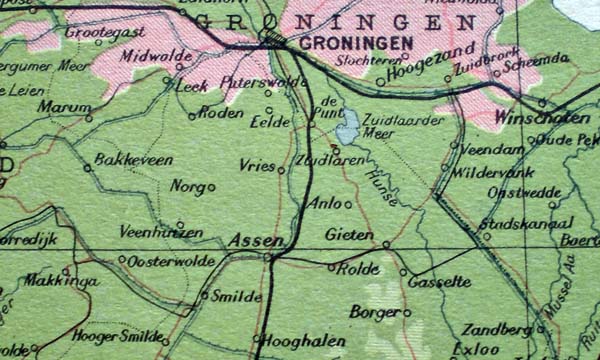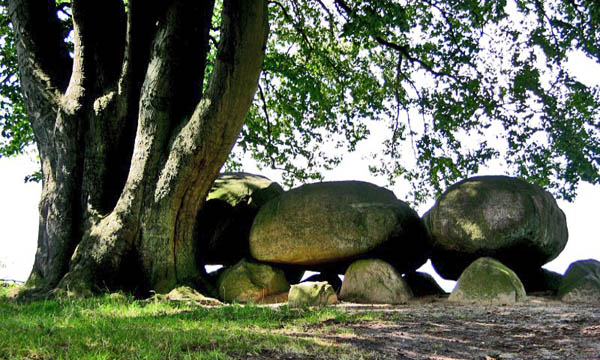Most Recent -
Next -
Previous -
Top -
Page 1 -
Photos -
Index -
Jazclass Links
Friday January 25, 2008
(bio, life in Assen, hunnebedden, pigeons, antiques)
 Antiques hunt 1
Antiques hunt 1
We stayed in Den Haag for a full year, while I first finished my degree
and then went into Army training at Ossendrecht and Breda, allowed home for
a weekend every fortnight (14 days).
For a brief spell Antien went to stay with my parents in Martinshof
to give birth to Babette, but soon after that moved back again to the
Statenlaan.
I graduated from the SROA in July 1964 and was then assign to
the 42nd Afdeling Field Artillery (consisting of three operational
and one support staff battery, 18 Howitzers and 400 men total) based in
Assen in the Northern Dutch Province of Drenthe. Antien had
done some house hunting beforehand and found us a lovely small 2 story
townhouse in a row of six in a new suburb just across the Assen - Meppel
Canal.
 We moved in straight away and soon became good friends with the couple next
door and the one across the road. We used to have small parties on weekend
evenings, often ending up with a midnight expedition to one of the
hunnebedden scattered through North Drenthe's country side around
villages like Rolde, Anlo and Gieten. Hunnebedden are thought
to be at least 2000 years old. They are ancient graves constructed from huge stones
probably transported into the area by glaciers from the last Ice Age. We
would sit on top of the stones in animated discussion and song and
celebrate these ancient wonders with a glass of wine or two before finally
returning home, feeling very much in tune with those ancient ancestors.
We moved in straight away and soon became good friends with the couple next
door and the one across the road. We used to have small parties on weekend
evenings, often ending up with a midnight expedition to one of the
hunnebedden scattered through North Drenthe's country side around
villages like Rolde, Anlo and Gieten. Hunnebedden are thought
to be at least 2000 years old. They are ancient graves constructed from huge stones
probably transported into the area by glaciers from the last Ice Age. We
would sit on top of the stones in animated discussion and song and
celebrate these ancient wonders with a glass of wine or two before finally
returning home, feeling very much in tune with those ancient ancestors.
Across the canal from us and next to the Army base grounds was Cafe van
Houten (Dutch pub). It was easily accessible from our home via a narrow
footbridge across the canal conveniently located exactly opposite the
Cafe.
Jan van Houten was a very eccentric pub owner, an
enthusiastic hunter and a fanatical antiques collector, and in due course we
benefited from all three of these qualities.
During the day Jan
would roam around the farms in the area with his shotgun harvesting wild
pigeons, considered a pest by the farmers. He would cut off the heads
from his daily catch, present them to the local Council and receive his one
Dutch Guilder (worth 2 glasses of beer then) per pigeon killed. The bodies
he would keep at home and sell to his Cafe regulars for a reasonable price.
We ended up with many of them which Antien learned to cook to perfection.
They were quite delicious.
Antien and I had started collecting antiques and odd curiosa back in Den
Haag, roaming the flea markets every weekend. Our greatest trophy so far was
a zinc sit bath, which I painted black and Antien filled with
pillows, transforming it into a comfortable lounge chair.
With Jan in
Assen we hit the Jackpot however. He had a collection of 250 tobacco boxes
fixed around the top of his bar, and various items scattered everywhere
especially around his copper hooded open fire place.
One evening I was sitting at the bar together with another young antique
enthusiast who managed a hotel in town. We were egging Jan on a little.
"You are pretty good at finding things Jan" my young friend said
"but spinning wheels, no, they have all been snapped
up long ago, you don't see them around anymore".
"No, you're damn right
there." I contributed "Many of those horrible
fake new ones in shops, but the genuine antiques, they're all
gone." |
Jan was by now so agitated he hardly could speak a word. "You guys know nothing ! Nothing at all !!" he finally
blurted out. "Come back in three days, and I'll have a
whole bunch of them right here around my bloody fire place!"
We
made a bet with him and promised to return in three days.
Well, he
bloody well did it too. Six of them neatly arranged around his fire place,
all genuine antiques. We handed over Jan's winnings and immediately proceeded
to drink his price, because he was a very generous man, never a miser. And
even the police, who soon after came in to collect one of the wheels to
return it to its rightful owner, could not spoil our party that night.
Antiques hunt continues on January 28
Comments -
Most Recent -
Next Page -
Previous -
Top -
Page 1 -
Photos -
Index -
Topics -
Jazclass Links
Copyright © 2008 Michael Furstner